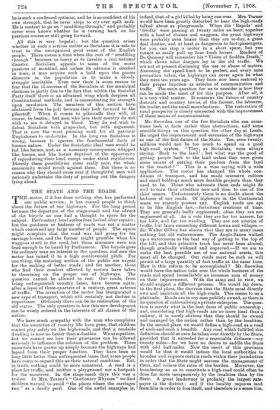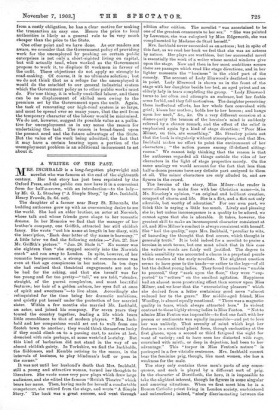THE STATE AND THE ROADS. T HE, motor, if it has
done nothing else, has performed one public service ; it has caused people to think about the future of our highways. For the long period between the departure of the stage-coach and the advent of the bicycle no one had a thought to spare for the subject. Perfunctory local authorities looked after repairs ; but the goodness or badness of roads was not a matter which concerned any large number of people. The squire might complain that the road was bad going for his carriage-horses, and the farmer might grumble when his waggons stuck in the mud, but these murmurs were not loud enough to be heard by Parliament. The bicycle gave the ordinary man an interest in the question, and now the motor has raised it to a high controversial pitch. For one thing, the motoring section of the public are urgent for the making of better roads ; and for another, those who find their comfort affected by motors have taken to theorising on the proper use of highways. The question cannot be allowed to rest. Our. roads, from being unfrequented country lanes, have become again, after a lapse of three-quarters of a century, great arteries of traffic. The invention of the motor has inaugurated a new type of transport, which will certainly not decline in importance. Obviously there can be no restoration of the old status. The only question is how this new development can be wisely ordered in the interests of all classes of the nation.
We have much sympathy with the man who complains that the amenities of country life have gone, that children cannot play safely on the high-roads, and that a roadside dwelling is now no better than a dustbin. We sympathise, but we cannot see how their grievances can be allowed seriously to influence the solution of the problem. These amenities have grown up simply because the highways had lapsed from their proper function. They have been so long little better than unfrequented lanes that some people have come to regard this as their natural condition. But, in truth, nothing could be more unnatural. A road is a place for traffic, and neither a playground nor a footpath for the saunterer. In the stage-coach days this was a truism. In Mrs. Turner's " Cautionary Rhymes " we find children warned to avoid "the places where the carriages run " as a deadly peril. One of the awful examples is, indeed, that of a girl killed by being run over. Mrs. Turner would have been greatly disturbed to hear the high-roads talked about as . playgrounds. When the Rapids'. and Swifts' were passing at twenty miles an hour, together with a host of chaises and waggons, the. great highways were probably even busier than they are to-day, a great deal dustier, and at least as dangerous to foot-passengers, for you can stop a motor in a short space, but you cannot so easily pull up four fresh horses. Readers of De Quincey will remember his "Vision of Sudden Death," which shows what dangers lay in the old traffic. We are not at present discussing the use or abuse of motors. Assuming the speed-limit to be perfect, and every sane precaution taken, the highways can never again be what they were ten years ago. They have now been restored to their proper function as arteries of communication and traffic. The main question for us to consider is how they can be made the most of for this purpose. After all, it is a very vital matter. It concerns the future of country districts and country towns, of the farmer, the labourer, the trader, and the small manufacturer. The restoration of rural prosperity is closely connected with the improvement of these means of communication.
Mr. Snowden, one of the few Socialists who can some- times look at facts rather than abstractions, said some sensible things on this question the other day at Leeds. He urged the improvement and extension of the highways as one of the first duties of the State. Ten, even twenty, millions would not be too much to spend on a good high-road system. " They, as Socialists, were always saying, 'Back to the land' ; but what was the good of getting people back to the land unless they were given some means of getting their produce from the land to the market ? " This is a wise saving with a wide application. The motor has changed the whole con- ditions of transport, and has made intensive culture and small holdings much more feasible projects than they used to be. Those who advocate these ends might do well to turn their attention now and then to one of the chief means. Unfortunately there is no doubt about the badness of our roads. Of highways in the Continental sense we scarcely possess any. English roads are apt to be like English law,—fortuitous creations of time. They are generally badly engineered; often they are not engineered at all. As a rule they are far too narrow, far too hilly, and far too winding. They are not arteries of traffic, but lanes connecting different towns and villages.— Sir Walter Gil bey has shown that they are in many cases nothing but old watercourses. The Anglo-Saxon walked up a watercourse as the best way of getting to the top of the hill, and this primitive track has never been altered, though gradually widened and improved.—If we are to make the best possible use of our national assets, this must all be changed. Our roads must be such as will permit of a large quantity of fast traffic at the same time. How is this reform to be accomplished ? Mr. Snowden would have the nation take over the whole business of the roads and spend immediately an immense sum of money on their improvement. With the same end in view, we should suggest a different process. We would lay down, in the first place, the doctrine that the State must directly own and maintain all the high-roads. This seems to us a platitude. Roads are in any case publicly owned, so there is no question of nationalising a private enterprise. The ques- tion is merely what is the best form of public ownership ; and, considering that high-roads are no more local than railway, it is surely obvious that they should be owned and managed by the nation rather than by the localities. In the second place, we would define a high-road as a road of such-and-such a breadth. Any road which fulfilled this definition should at once be taken over directly by the State, provided that it extended for a reasonable distance—say twenty miles—for we have no desire to saddle the State with odd half-miles. Now the merit of this provision would be that it would induce the local authorities to broaden and improve certain roads within their jurisdiction in order that the State-might assume the management of them, and relieve the rates of the burden. Moreover, the broadening so as to constitute a high-road could often be done far more inexpensively by the localities than by the State. A great landowner is probably the largest rate- payer in the district ; and if the locality requires land from him in order to free itself, and therefore in a sense him,
from a costly obligation, he has a clear motive for making the transaction an easy one. Hence the price to local authorities is likely as a general rule to be very much cheaper than the price to the State.
One other point and we have done. As our readers are aware, we consider that the Government policy of providing work for the unemployed by pushing on certain public enterprises is not only a short-sighted living on capital, but will actually tend, when worked as the Government propose to work it, to displace fit workmen in favour of the unfit. These objections do not apply so strongly to road-making. Of course, it is no ultimate solution ; but we do not think that as a refuge for the unemployed it would do the mischief to our general industrial system which the Government policy as to other public works must do. For'one thing, it is wholly unskilled labour, and there can be no displacement of skilled men owing to the premium set by the Government upon the unfit. Again, the task of renovating our high-road system is so large, and must be spread over so many years, that the evil from the temporary character of the labour would be minitnised. We do uot, however, suggest its possible value as a pallia- tive for unemployment as in any sense the reason for undertaking the task. The reason is broad-based upon the present need and the future advantage of the State. But the value of the work being admitted, the fact that it may have a certain bearing upon a portion of the unemployment problem is an additional inducement to set about it.





























































 Previous page
Previous page